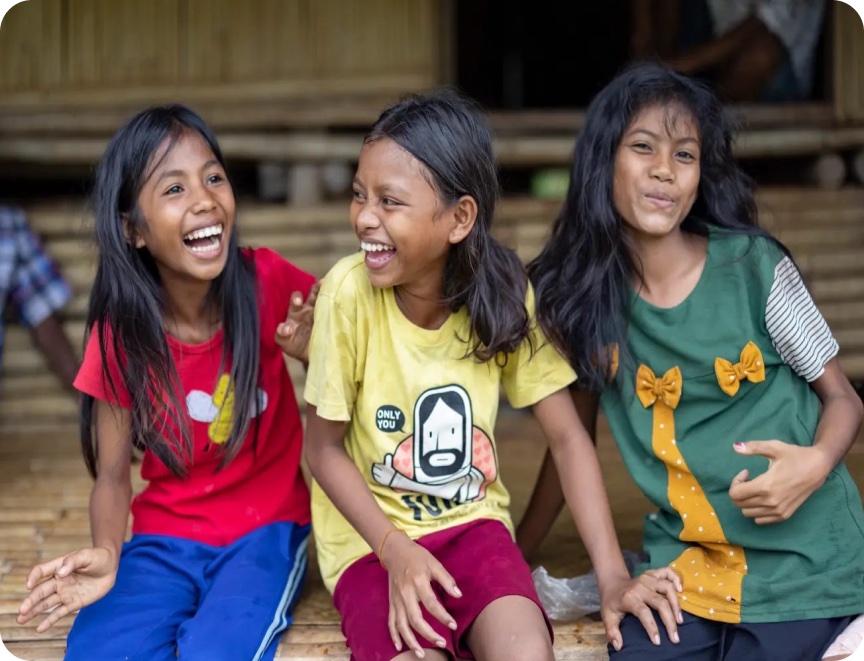A tragedy behind closed doors
Millions of children across the Pacific are experiencing high levels of domestic violence, including in Papua New Guinea and the Solomon Islands. For the vast majority of children, this violence is happening in a place where they should feel safest: their homes and communities.
By ChildFund Australia
The following story contains content that may be distressing for some readers.
Elizabeth* is four years old but she already bears the painful scars of abuse that far too many people experience in life.
Elizabeth is from a poor community in Papua New Guinea, where domestic violence – mainly against women and children – is common in families and households. For months, Elizabeth, was physically abused by one of the people who should have loved her most – her father.

Today, Elizabeth is living with her mother again. Elizabeth’s father has been charged, and Elizabeth and her mother have protection orders in place.
Maggie has been in touch with the helpline counsellors, providing them with updates on Elizabeth’s wellbeing. She said Elizabeth and her mother were both safe and living at peace. All this would not have been possible, Maggie said, without the support of the counsellors and emergency funds that were secured through the 1-Tok Kaunselin Helpim Lain service.
*Names have been changed to protect individuals’ identities.
‘Our mothers, sisters, daughters and wives are suffering from a weak protection system’
Millions of children like Elizabeth across the Pacific, including Papua New Guinea and the Solomon Islands, where ChildFund works, are experiencing high levels of domestic violence including physical, emotional and sexual abuse, as well as neglect. For the vast majority of children, this violence is happening in a place where they should feel safest: their homes and communities.
With the COVID-19 pandemic, reports of domestic violence increased around the world along with social isolation, unemployment and alcohol use.
In Papua New Guinea, more than 2 in 3 women and girls experience some form of physical or sexual violence in their lifetime.
Ivodia Malio, a Senior Counsellor with the 1-Tok Kaunselin Helpim Lain, said the rates of violence in Papua New Guinea were “concerning”.
“There is a great need for family and sexual violence services to work together to develop better strategies to address the high rates of violence in the country,” she said.
“The 1-Tok Kaunselin Helpim Lain is doing great work to assist vulnerable women and children to be safe. Perpetrators are also calling the helpline for support to change their abusive and violent behaviours.”
Ivodia’s colleague and fellow helpline counsellor, Simon Karapus, said domestic violence services in Papua New Guinea needed to be overhauled and strengthened: “Our mothers, sisters, daughters and wives are suffering from a weak protection system,” he said.

In the Solomon Islands, 2 in 3 women between the ages of 15 and 49 have experienced physical and/or sexual violence by an intimate partner. More than a third of these women experienced sexual abuse as a child.
The success of the 1-Tok Kaunselin Helpim Lain service in Papua New Guinea has led to ChildFund supporting a similar crisis helpline in the Solomon Islands.
How your donation can protect children from domestic violence
Ensuring children are safe and free from domestic violence is a collaborative effort between development organisations such as ChildFund, and children, their communities, and local governments.
With your help, vulnerable children and their families can access the immediate and long-term support they need to be safe. ChildFund is working with local partners to provide not only services such as crisis counselling and referrals to safe houses, we are also working with governments and communities to strengthen child protection systems. Your donation will also help educate and empower young people to raise awareness and lead advocacy activities in their communities that focus on peace promotion, conflict prevention, and respectful relationships.
Helplines and counsellors: Train and upskill counsellors for Papua New Guinea’s 1-Tok Kaunselin Helpim Lain service, which provides immediate and long-term support to survivors of violence.
Youth Peace & Protection Champions: Educate and empower young people to raise awareness and lead advocacy activities in their communities that focus on preventing and resolving conflicts peacefully, prevention of violence, and respectful relationships.
Child protection frontline workers: Train social workers, counsellors, village court officials, and staff at safe shelters and family support centres, on women’s and children’s rights, and case management.





























